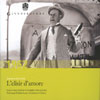Donizetti (L') Elisir d'amore
Glyndebourne’s ‘62 Elisir, and there’s only one star – Freni, Freni, Freni!
View record and artist detailsRecord and Artist Details
Composer or Director: Gaetano Donizetti
Genre:
Opera
Label: GFO
Magazine Review Date: 1/2010
Media Format: CD or Download
Media Runtime: 0
Mastering:
Stereo
Catalogue Number: GFOCD005-62

Tracks:
| Composition | Artist Credit |
|---|---|
| (L')Elisir d'amore, 'Elixir of Love' |
Gaetano Donizetti, Composer
Carlo Felice Cillario, Conductor Gaetano Donizetti, Composer Glyndebourne Festival Chorus Luigi Alva, Nemorino, Tenor Mirella Freni, Adina, Soprano Royal Philharmonic Orchestra Sesto Bruscantini, Dulcamara, Bass |
Author: Mike Ashman
Glyndebourne’s first go at the piece at the start of the 1960s is an essentially un-serious affair, taking its cues from the pretty story-book naturalism of Franco Zeffirelli’s staging, Bruscantini’s always near-the-top Dulcamara and maestro Cillario’s laid-back conducting. But real enjoyment is to be had from their combined experience. Cillario and his players (a Royal Philharmonic just after Beecham) are never over-heavy or thumpy, and Bruscantini is nearly always good to hear. Only the Act 2 barcarolle duet is a Venetian lagoon and a half too much, and the orchestra’s stage banda sound like they’ve rivalled the audience in long-interval imbibing. But the real star(s) are Freni, Freni and Freni – a gorgeous-voiced mix of tease, wit and seriousness, whose success in a role she kept in her repertoire until the 1980s was important in escalating her international career. And, mostly, Alva, whose more-upper-class-than-usual Nemorino is good at finding playboy self-illusion in the voice.
The recording, a completely in-house job by Glyndebourne’s famous recordist John Barnes, sounds sensitive to singers’ placing onstage and their nearness to scenery. The basic sound feels its 47-year vintage, although careful transfer work has given important human and instrumental voices more space and presence than they might have had. The contemporary English newspaper reviews were amusingly worried about Adina’s not-quite-proper character. “Freni rightly allowed real tenderness to shine through vanity and caprice”, the Sunday Times was relieved to report, while a colleague was pleased that “she acts her teasing charades with Sergeant Belcore as if nothing were farther from her mind than cruelty”.
Discover the world's largest classical music catalogue with Presto Music.

Gramophone Digital Club
- Digital Edition
- Digital Archive
- Reviews Database
- Full website access
From £8.75 / month
Subscribe
Gramophone Full Club
- Print Edition
- Digital Edition
- Digital Archive
- Reviews Database
- Full website access
From £11.00 / month
Subscribe
If you are a library, university or other organisation that would be interested in an institutional subscription to Gramophone please click here for further information.




